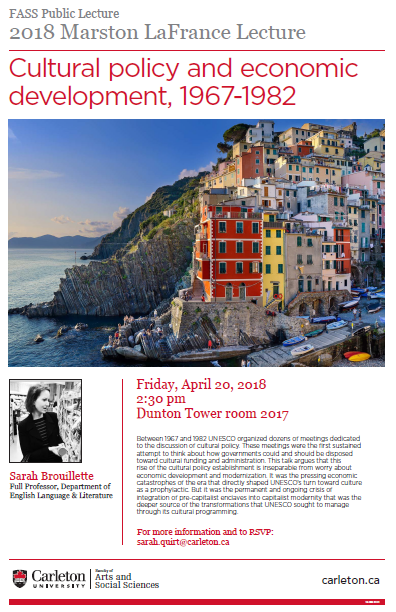by Jonathan Chau (PhD Candidate, English)
One of the ironies of a professor’s occupation is that, despite being an inherently public-facing profession, recognition of his or her accomplishments is seldom made public. Beyond the usual metrics—teaching evaluations and the like—one of the ways that a professor’s talent is recognized is through the awarding of research grants. Funding bodies, which range from local Carleton initiatives to national councils, award these grants based on merit, considering both the quality of the applicant’s research project and his or her research history. With grants ranging from several thousand to multi-million dollar prizes, these awards are highly competitive, and grant recipients are widely regarded as some of the best researchers in their respective fields. Despite the prestige attached to these awards, winners are rarely announced with any pomp and circumstance. And in a way, that makes sense. To academic scholars, it seems appropriate that the focus should be placed solely on the work itself, and that any sort of funding opportunity must seem like a happy coincidence; one gets the sense that award winners would happily pursue these projects even without funding. But because these grants are so competitive, winning an award is not merely a matter of prestige: it also highlights the sort of cutting-edge research that drives the shape of literary studies.
In recent years, faculty members in Carleton’s Department of English Language and Literature have enjoyed success in these competitions, winning awards as varied as Carleton University Development Grants, Faculty of Arts and Social Sciences (FASS) Research Awards, Marston LaFrance Research Fellowships, and various grants from the Social Sciences and Humanities Research Council (SSHRC). The winning projects are every bit as diverse, bringing together fields that are occasionally thought of as disparate and disconnected, and even the quickest glance at these professors’ research platforms reveals new and sometimes surprising insight into their expanding scholarly interests.
Dr. Siobhain Bly Calkin is known both nationally and internationally as an expert in medieval literature who can frequently be found regaling students with lectures on the surprisingly bawdy nature of the medieval writer Geoffrey Chaucer. But the project for which Calkin received a SSHRC Insight Grant moves outside the town of Canterbury and examines, as she puts it, “experiences of cultural dispossession involving religious artifacts.” Calkin’s research investigates the ways in which these relics function as objects that bridge the human and the divine, wondering just what happens when a religious artifact is captured and weaponized by those of an opposing faith. While Calkin’s objects of study are firmly rooted in 1095-1500CE, what she hopes to discover is far more topical than those dates may suggest: namely, the historical precedents that created the dynamic between Christians and Muslims in our time.
Scholars in our department wear many hats. Dr. Sarah Brouillette teaches courses in cultural theory and contemporary global Anglophone literatures, while focusing in her research on the publishing industry and institutions of cultural production. Like Calkin’s work on religious relics, Brouillette’s current work is a window into the past that enables us to make sense of and navigate our present. In 2013, Brouillette received a SSHRC Insight Grant for a project that examines the role UNESCO has played in the publishing industry. She notes that the humanitarian organization not only offered the first official definition of a book (“a non-periodical printed publication of at least 49 pages, excluding covering matter,” if you’re curious) and didn’t merely devise the ISBN number, but also spent thirty years as “the premier sponsor, facilitator, and consolidator of research on the book trades in the developing world.” Brouillette argues that this positions UNESCO as a sort of patron of the history of publishing, supporting the scholars who would come to inaugurate the scholarly field known today as “Book History.” Given its significance, Brouillette found it odd that a detailed history of UNESCO’s role in publishing had yet to be written.
Brouillette’s interest in UNESCO has since evolved to become an all-encompassing investigation and critique of cultural policy – an evolution supported by a Marston LaFrance Research Fellowship held in the 2017-2018 academic year. Using UNESCO as a case study, Brouillette’s work tackles the ways in which cultural policy is connected to and often shaped by events in the global economy. Tracking historical trends within the global economy, Brouillette finds correlations within the culture industry, leading to occasionally chilling but always interesting insights. For instance, she notes that postwar economic expansion fed directly into the culture industry whose products were often purposefully put to work by governments that sought to secure the global dominance of liberal capitalist democracies. Despite being a historical project, Brouillette’s work on the culture industry has the potential to reveal the ways in which economic constraints undercut artistic autonomy, a tension that seemingly permeates all of the media that we consume today.
To be sure, both Calkin and Brouillette are recognized experts in the fields to which their projects belong. But what happens when one’s curiosity exceeds one’s personal expertise? As Professors Julie Murray and Stuart Murray have shown, one forms an academic dream team. As principal investigators, Julie Murray and Stuart Murray have invited Professors Sara Kendall (University of Kent) and Franny Nudelman to collaborate with them on a project that studies the role of sentimentality in the rapidly changing framework of human rights. As the professors note, sentimentality becomes problematic when it informs and justifies political and military actions, particularly those linked to human-rights violations. To make sense of this disjunction, the group turns to the 19th century, which they identify as the period that gave rise to sentimentality as we know it today. While ostensibly a “literary studies” project, the work for which the professors received a SSHRC Insight Development Grant is unabashedly interdisciplinary. The project capitalizes on each member’s expertise, leveraging Stuart Murray’s expertise in biopolitics, Julie Murray’s talents as a scholar of nineteenth-century literature, Franny Nudelman’s background in the study of nineteenth-century history of the Unites States, and Sara Kendall’s expertise in international law. The hope, the group tells us, is that the project will show that this sentimental impulse found in nineteenth-century literature has not only survived, but continues to animate a political reality that determines who will live and who will be allowed to die.
While research grants function as validation of research projects, their effects are felt widely. Each award has a galvanizing effect that manifests in various ways, ranging from lively hallway discussions to employment opportunities for graduate students. And the projects listed in this article are in no way exhaustive. To this list, we might add Paul Keen and Cynthia Sugars’ SSHRC Insight Grant, Sarah Casteel’s Canadian Jewish Literary Award, Jody Mason’s FASS Research Award, Andrew Wallace’s CU Development Grant, Don Beecher’s Montaigne Prize from the Canadian Society for Renaissance Studies, and Barbara Leckie’s recent SSHRC Insight Grant. In the coming weeks, you’ll read more about each project, from the motivations behind the work, the status of the project, and the more surprising discoveries that were found in the process.


